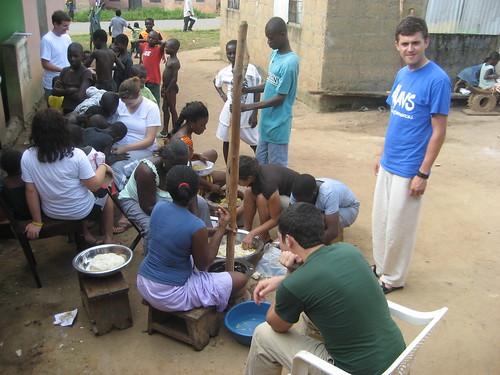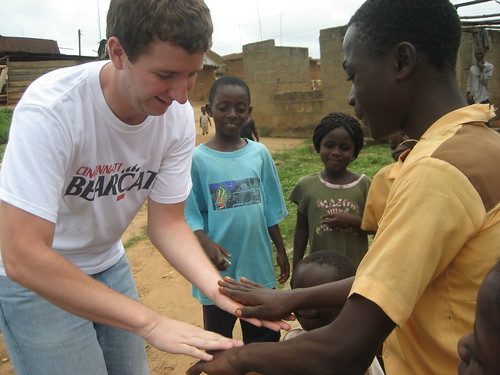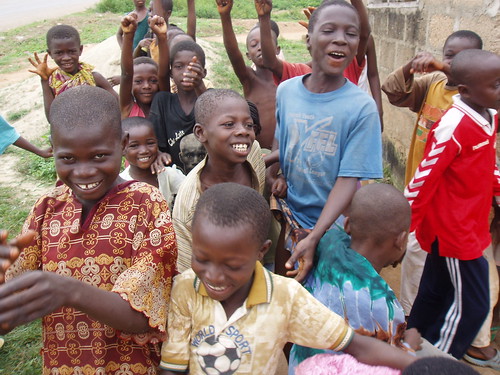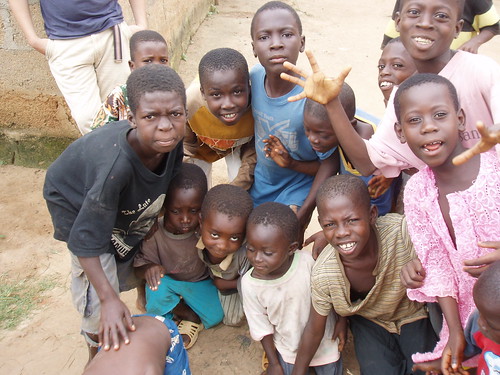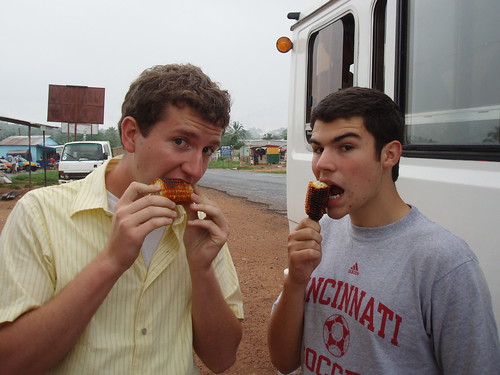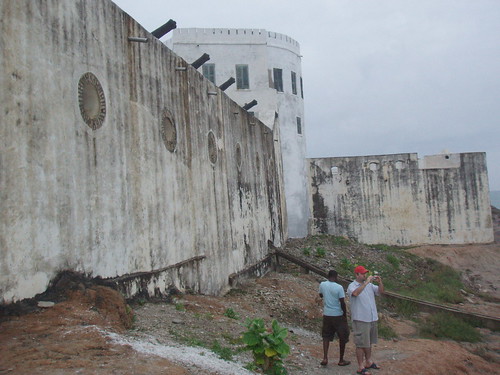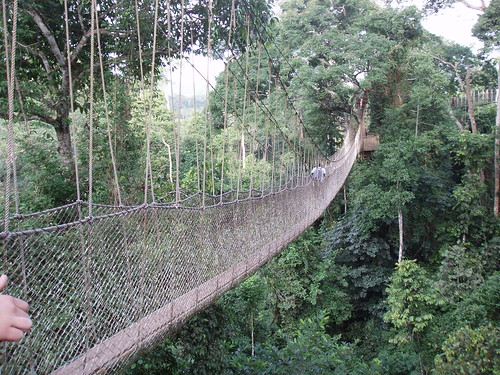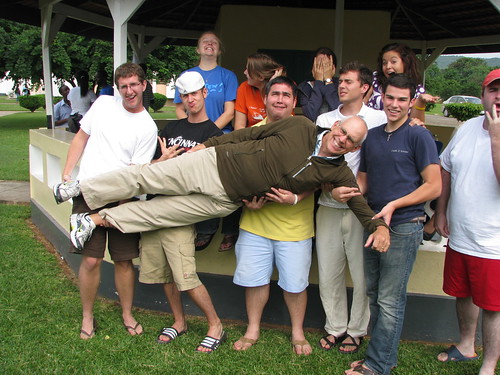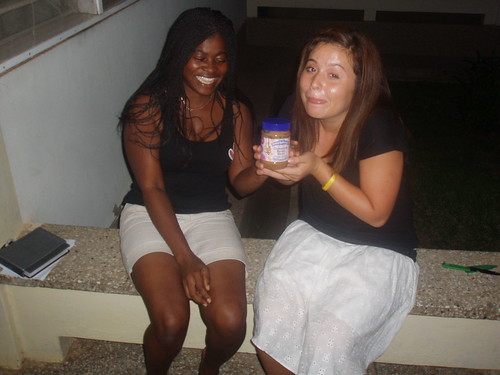Yesterday was our tourist day. Since half of the team will be heading home on Friday, we wanted to have a good bonding session and see a different part of the country. So we headed west along the ocean to Cape Coast. When Obama was here a couple weeks ago, he went there, too. There is an old castle that was used to hold captured Africans before they were taken away to work as slaves. It is also the sight of a major national reserve,
Kakum Forest.
Cape Coast was about a three hour drive from Accra. I'm really not sure if it actually took three hours or if it was significantly more. I slept through most of the trip and time is mattering less and less anyway. So the moral of that story is that it doesn't really matter how long it took. We went to the forest first and it was pretty intense. There was a little museum at the entrance that explained the area a little bit and some of the animals that live there. Apparently there are forest elephants that are a lot more sneaky than regular elephants. You're more likely to see them at night or in the early morning (and when there aren't large groups of screaming schoolchildren there), so we didn't see any. We entered the forest with a tour guide and she took us up a path and eventually to a little hut. The hut was attached to a rope bridge that stretched to another
treehouse in the distance. One by one we went out on to the bridge and it would sway back and forth with each step. At first it was fine, but as we went from tree to tree, the bridges got progressively higher from the ground. We were way, WAY up in the canopy of the forest looking at the beautiful thing that God created. Terrifying, yes, but beautiful. Finally, after seven bridges, we reached another hut that took us to the ground and to the path.
From there, we got back on the bus and went to the slave castle. It was getting later, so the castle was no longer open, but we still walked around it and climbed on the rocks along the ocean. It was sad to look at - gorgeous scenery spoiled by a building representing one of the great human cruelties of the world. Things like that are important to see, though. It helps us to remember so that history will not be repeated. The tragic thing is that slavery really does continue to this day; it just looks different and has changed locations.
Climbing along the rocks, we all got some pictures of the water, the beach, and each other. Four of us, Matt, Tom, Briana, and I, were standing on a rock that was at a pretty high point. We were getting shots of the waves crashing into the lower parts of the beach and splashing up onto the rocks. Suddenly we noticed a larger wave coming in. I knew it was going to be a great picture when it hit. Then I think we all had several realizations at once, though some of us more quickly than others.
- The wave was coming very much in our direction.
- The rocks we were standing on were wet.
- We were about to be very wet.
Matt and Tom booked it and escaped with only minor splashes. Briana and I did not. Briana managed to turn enough to just get soaked on one side. I was still taking a picture when the wave came up and the camera finally snapped about 13 milliseconds before I got soaked, so I have a pretty sweet shot of a wall of water. We all had a good laugh and I enjoyed the trip back to Accra without a dry spot on me.
Today, some of our team that had not been out exploring quite as much as Matt and I wanted to go out and get some gifts for themselves and for people at home. We met at the Navs Office and from there got into two taxis to go to the Accra Mall. This was a slice of the western world on the African continent. There was still a good amount of Ghanaian paraphernalia, but with the movie theater and Nike store, traces of American life were there. I did peak in the pharmacy while I was there and compare things a little bit. There were some things that I hadn't heard of, but for the most part, there were a lot of the same products, just with different brand names. At the mall, Matt and I did score a couple hot Ghanaian shirts. So be excited for those to make an appearance in the US.
I had a couple more stories from the last two weeks to share, so I thought I would pass those along to you now, too.
Paul the Security Guard
Matt and I walked to the football stadium one day to see if we could find a schedule of games. We were peaking around the building and not really finding any type of schedule. Eventually, we found our way to the main entrance and there was a security guard sitting there, checking cars as they passed through. We walked up to him and asked about a schedule. He said some things and I honestly didn't follow very much of it, but he was very friendly. He introduced himself as Paul and we gave him our names. He did say there would be some kind of game/event/celebration on Sunday, and we thanked him for the information. He then asked if we would be there. We weren't sure so he asked a few more questions to try to pick a day that would work for us. Finally, he decided it would be easiest just to give us his cell phone number and we could call him any time we had questions. We took down his number, thanked him, and left laughing. Can you imagine a security guard doing that at home? Ghana is great.
Empty Coke Bottles
One day, Matt and I were in Central Accra, where the business district is. We had gone just to look for a bookstore and familiarize ourselves a bit. Before we left, we decided to get a couple Cokes. So at the first stand we saw, we stopped to buy two. The lady said, "twelve thousand," which really threw me off. You have to understand the currency in Ghana to follow this. The currency in Ghana had become so high at one point, that it was ridiculous. One dollar would equal about fifteen thousand cedis. So, to make things easier, they changed their currency by making ten thousand old cedis equal to one new cedis. But people still use the numbers interchangeably, so you have to think about it sometimes. And, when I do it in my head, sometimes I forget that it's a ten thousand to one conversion, not a one thousand to one. So, making that mistake, I gave her twelve cedis (about eight dollars) for the two cokes, all the while thinking, "Wow, this seems kind of steep, but she already opened the bottles." Graciously, the woman explained my error and returned my money to me. She gave us our two glass bottles of Coke and we walked off. We got in a taxi. We arrived at home. We went in to talk to Gina. Her eyes were big when she saw the bottles. She asked, "How did you get those bottles?" We told her, somewhat confused, that we bought them in the city. She said, "Yes, but they let you keep the bottles?" That's when I remembered that they usually take your bottles when you're done, because they get a significant return on them. The whole interaction with that woman had been full of grace. Not only did she return what could have been a big profit for her, but she let us take a large chunk, if not all, of her normal profit by letting us keep the bottles. I know it seems small, but that's a pretty big deal here. I'm not really sure why she decided to do that, but it was nice.
Water On, Water Off
Bathing, brushing your teeth, and flushing the toilet are games of chance here. I'm not complaining, I just think it's a funny scene every time and a good bit of perspective for us with constant and abundant access to water in America. The water turns on and off without notice here. And I'm not really just talking about a couple hours here, a couple hours there or on this day, off that day. Often, when I take a shower, the water turns on and off about three times. So, most times, I just use the bucket method that we learned in Swedru, although the accommodations and lighting are significantly better. It's actually a very fun and refreshing way to shower. And to brush your teeth. Flushing the toilet isn't always as much fun or as easy, but hey, it's a mission trip.

